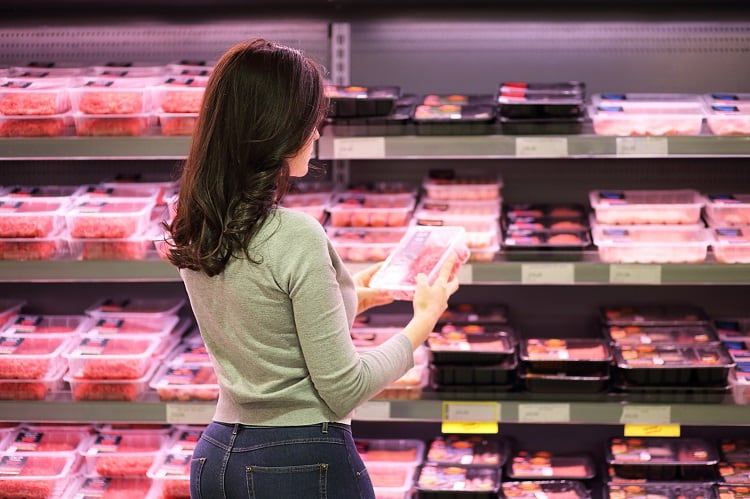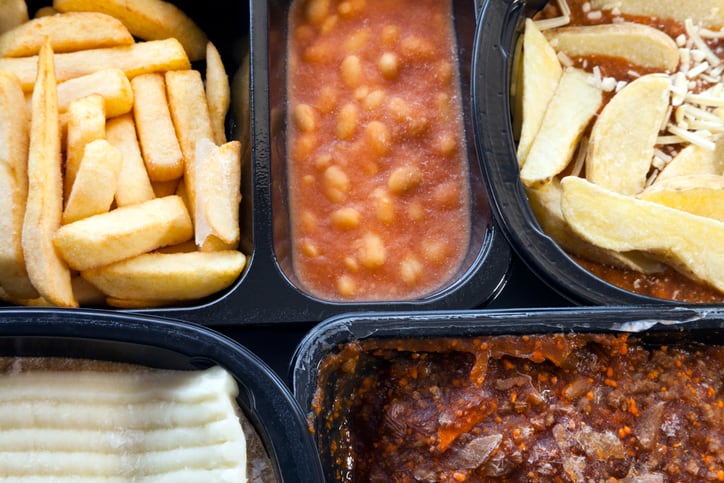As the ‘most powerful actors’ in the food system, supermarkets have a responsibility to reduce industrially produced meat and dairy from consumers’ diets, according to UK NGO Feedback.
The not-for-profit, which aims to regenerate nature by transforming the food system, is campaigning for retailers to halve their meat and dairy sales within the next 10 years.
Meat and dairy ‘fanning the flame’ of climate crisis
One-quarter of the world’s greenhouse gas emissions results from food and agriculture. As the ‘single biggest’ impact humans have on the planet, global food production must be addressed if we are to solve climate change, argued Feedback in its ‘Meating the climate challenge’ report.
For the not-for-profit, it is ‘very clear’ that industrially produced meat and dairy is ‘fanning the flame’ of the climate crisis. In a business-as-usual situation, research indicates the livestock sector will account for 49% of the world’s emissions budget for 1.5°C by 2030 – within the next 10 years.
Some key concerns linked to the livestock sector include the amount of land and water used, and greenhouse gases directly generated. But the campaign group is also concerned about industrial animal agriculture’s reliance on purpose-grown soy.
More than 75% of the world’s soy production ends up in animal feed. In the UK, it has been estimated that 71% of soy meal is imported from South America – around 50% of which is used in the production of pork and chicken.
Soy production is driving deforestation in ‘highly fragile biomes’, noted the NGO, which is now the second leading cause of climate change globally, following burning fossil fuels.
Pressure is mounting to decrease this environmental burden by shifting diets away from industrially produced animal products. Feedback believes supermarkets play a ‘key role’ in influencing dietary change.
‘Retailers contribute to over-purchase of meat and dairy products’
According to the NHS, UK consumers eat on average around 70g of red and processed meat per day. This is above dietary reference values, which stipulate 55.5g of protein per day for men and 45g for women.
Findings from a recent YouGov survey indicate that consumers are looking to limit their meat consumption – a significant 43% report making the choice to reduce their consumption of meat ‘fairly often’ or ‘all the time’ when food shopping.
As it stands, however, the UK food environment is ‘enabling significant overconsumption’ of meat and dairy, argued Feedback, stressing that it is difficult for shoppers to change their purchasing habits alone.
“Supermarkets play a critical role in shaping food environments; as such, they are the primary actors contributing to over-purchase of meat and dairy products,” noted the NGO.
“With the ‘top ten’ UK retailers controlling around 94% of the UK groceries market share, and with 75% of UK citizens saying they visit supermarkets twice or more a week, supermarkets are the most important interface between the majority of the population and the wider food system.”
This influence also extends into the home, the campaign group continued, citing branding, package sizes, labelling and advertising as contributing factors.
‘Supermarkets must sell less meat and dairy’
Growing interest in diets that meet demands for human and planetary health is undeniable. However, according to Feedback, a shift of the scale needed will be ‘difficult, if not impossible’ to attain without contribution from retailers.
“Change needs to happen fast,” noted the NGO, adding that the best place to start to decrease consumption of meat – notably processed meat, beef and chicken – is at the site of those purchases: supermarkets.
This is not to say that retailers aren’t acting. A great many have expanded their vegan ranges in recent times, including Sainsbury’s and Aldi who placed their lines in the meat section.
In Sainsbury’s Net Zero by 2040 commitment, published last year, the retailer discussed the broader role of sustainable diets, promising to report bi-annually on its sales of ‘both healthy and healthier products’ as a proportion of total sales.
Tesco is another retailer making nutrition and planetary commitments. Earlier this year, Tesco published ‘A Balanced Diet for a Better Future’, in which it called for balanced diets – with focus on less meat and dairy.
While Feedback acknowledged Tesco and Sainsbury’s have set a ‘crucial precedent’ in accepting the importance of dietary change in meeting climate challenges, the NGO said these commitments ‘must now be made concrete’.
Retailers must acknowledge the greenhouse gas emissions footprint of the products they sell is ‘inseparable’ from their overall environmental impact, it added. “Speeches and strategies on how retailers plan to achieve net zero stack up, but no supermarket CEO has yet expressly committed their business to reducing the amount of meat and dairy they sell, as part of a wider effort to take responsibility for and address their scope 3 emissions.”
A ’How To’ guide to meat and dairy reduction
So how does Feedback recommend supermarkets go about reducing sales of meat and dairy? A ‘range of actions’ are available to help supermarkets achieve such targets, argued the NGO.
A minimalist intervention strategy might see supermarkets raise awareness and build mandate for strong policy, such as working with influential messengers like TV chefs and cultural influencers, Feedback suggested.
Another option could be to ‘guide choice by changing the default’. This could see supermarkets edit the ‘choice architecture’ to make sustainable options more prevalent, more prominent, and the default choice. The retailer could also choose to sell meat in smaller portion sizes, and/or re-brand plant-based foods towards a mainstream identity.
Stronger interventions could include plain labels, similarly to those used on cigarette packages to deter smoking. Supermarkets could also decide to sell a smaller range of meat products, or reduce the amount of meat available on shelves at any one point.
Taking the hardest line could see retailers remove certain types of meat, such as soy-fed industrially produced chicken, from shelves.
Feedback acknowledged that further research is needed to determine which tactics would be most effective in reducing meat and dairy intake, but stressed ‘there is no lack of potential candidates with which to begin’.




